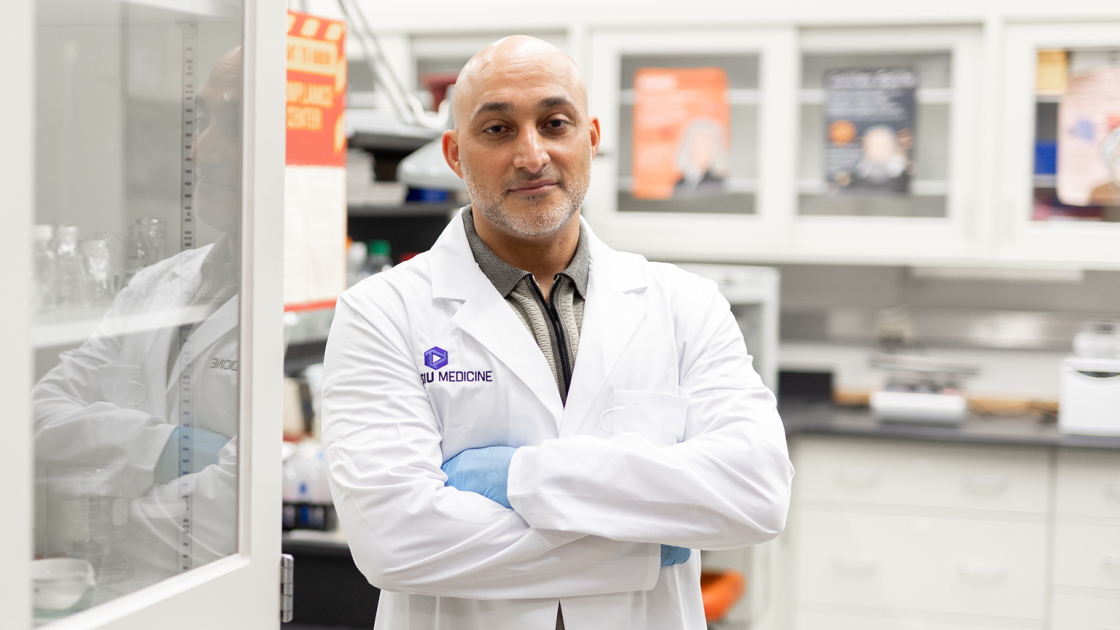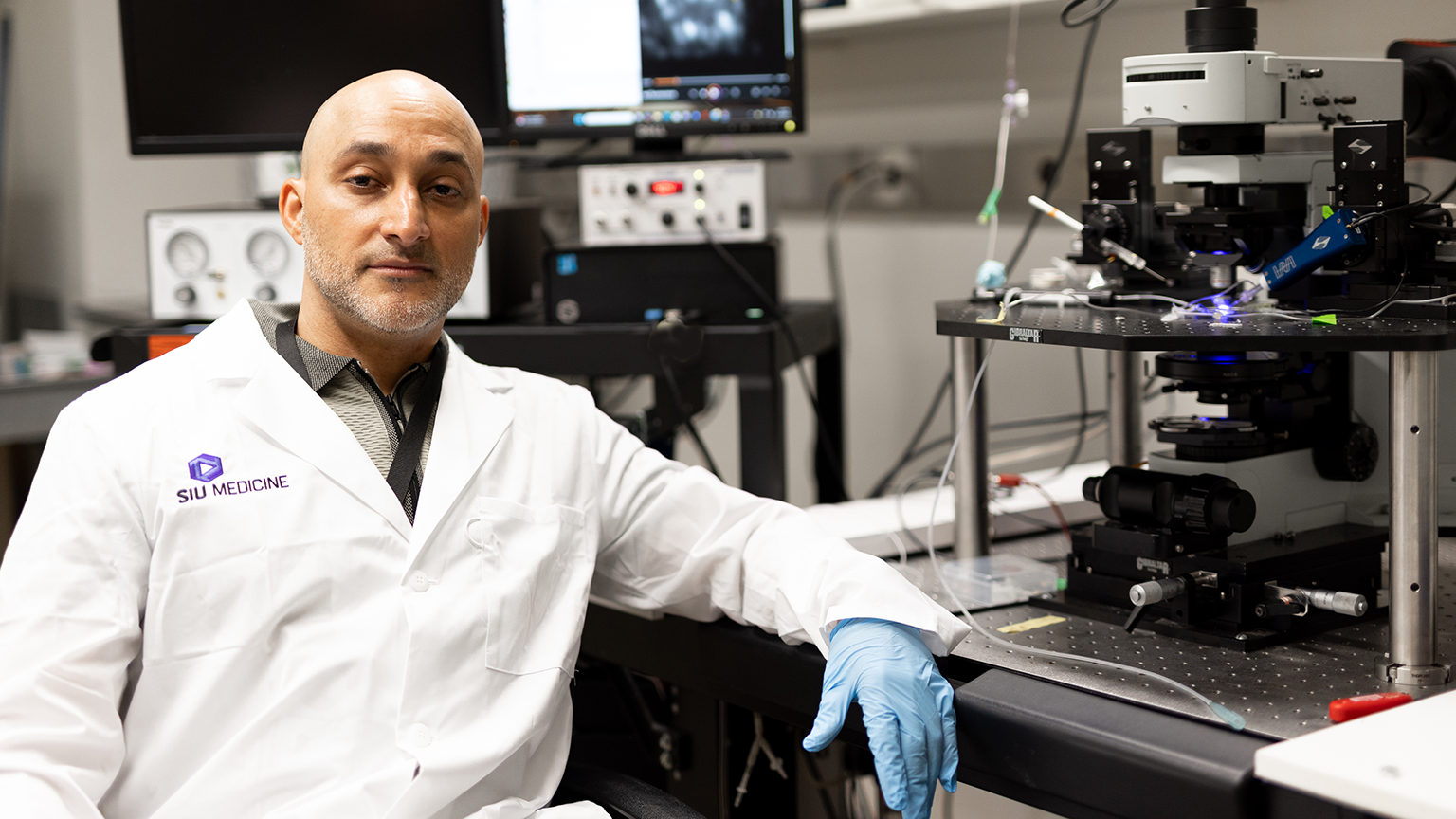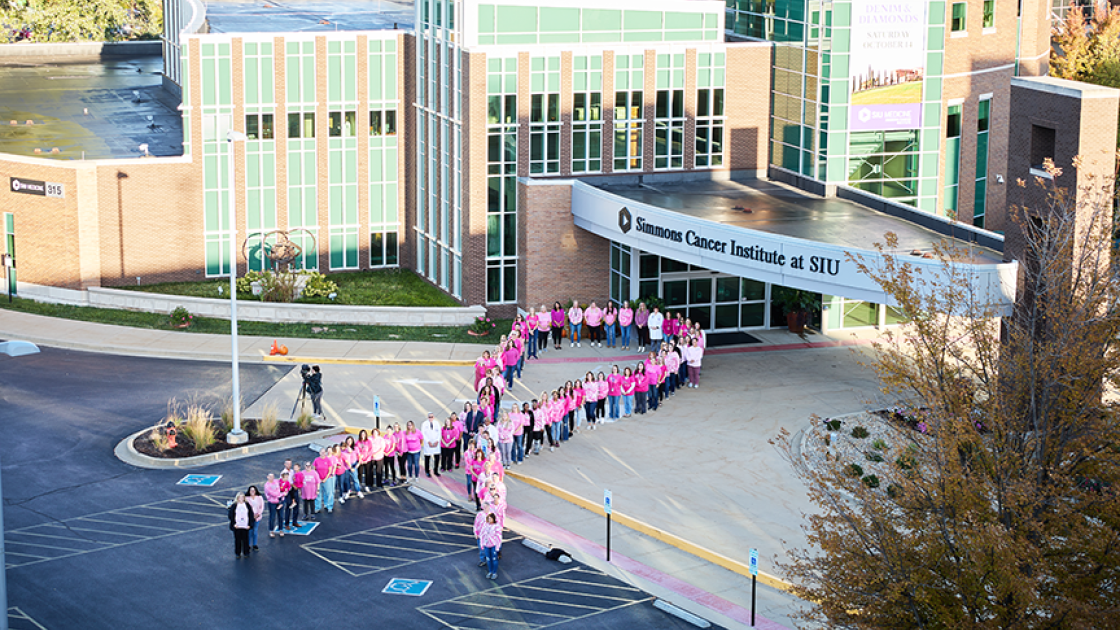
Jeffrey Parrilla-Carrero: Understanding addiction, one switch at a time
Jeffrey Parrilla-Carrero, PhD knows the face of addiction. As a boy in Puerto Rico, he watched his father battle alcohol use disorder, cycling through attempts to quit that ended in disappointment. The struggle left questions that never stopped tugging at him. Those questions would one day guide Parrilla-Carrero from an aspiring engineer to a neuroscientist — and ultimately, to SIU School of Medicine.
Watching his father try and fail to stop drinking sparked young Jeffrey’s curiosity. “At first I thought it was a lack of willpower,” he said. “But I came to understand that addiction is a chronic brain disorder. That realization changed everything.”
The question that drove him: Why do some people become addicted while others do not? The question has guided Parrilla-Carrero’s research ever since. Today, as an assistant professor in the Department of Pharmacology at SIU School of Medicine, he leads a lab focused on identifying the molecular “switches” in the brain that determine who is vulnerable to addiction and who is resilient.
His work aims to uncover the circuitry that could one day support targeted therapies for conditions like cocaine use disorder, a disease that currently has no FDA-approved pharmacological treatments.
Searching for the switch
Parrilla-Carrero’s research centers on individual variability. His lab uses animal models to understand how differences in brain signaling, particularly in the medial shell of the nucleus accumbens (a subregion of the brain that plays a crucial role in the processing of rewards and the regulation), influence drug-seeking behavior.
“We’re asking why some individuals can walk away after using a drug once, and others cannot,” he said. “We want to find out what’s happening in the brain to create that difference.”
His early work, published in The Journal of Neuroscience, revealed that animals who avoided cocaine had heightened inhibitory activity in a brain structure called the rostromedial tegmental nucleus (RMTg). The behavior was linked to stronger excitatory input via calcium-permeable AMPA receptors, and when these receptors were blocked, the animals’ natural avoidance of the drug was suppressed.
A second study, published in Cell Reports, identified a serotonin receptor (5-HT2C) in the RMTg as a critical player in this aversion. Animals with stronger serotonin-mediated activation of RMTg neurons displayed a natural resistance to cocaine. Those lacking this response were more likely to seek the drug again and were more vulnerable to relapse.
“Addiction is not just about how rewarding a drug feels,” he said. “It’s also about whether a response, or switch in the brain, is signaling something is harmful. When that system breaks down, people are more at risk.”
A critical step toward independence
In 2022, Parrilla-Carrero received the prestigious Mentored Research Scientist Development Award (K01) from the National Institute on Drug Abuse (NIDA), part of the National Institutes of Health. The highly competitive award provides three to five years of support for early-career scientists to launch independent research programs.
The grant provided more than funding, it validated his approach and gave him a foundation to build a new lab. “The K01 allowed me to take what I had developed as a postdoc and bring it into a new space where I could expand the work,” he said. “It’s a vehicle for independence.”
Parrilla-Carrero joined SIU School of Medicine in 2022, bringing the K01 grant with him. Since then, he has submitted an R01 grant to further investigate cocaine-seeking behavior and is preparing a second focused on fentanyl use, a growing crisis in communities throughout the Midwest.
 His current research examines three converging systems in the brain:
His current research examines three converging systems in the brain:
- Glutamatergic transmission in D2 receptor-expressing neurons of the nucleus accumbens
- Neuroinflammatory signaling, particularly involving SOCS5 and STAT4
- cAMP signaling pathways that may regulate how these systems influence drug-seeking
From South Carolina to Illinois, the problem is the same
Parrilla-Carrero completed his PhD at the University of South Carolina and his postdoctoral work at the Medical University of South Carolina, where he began developing his addiction-focused research. With the K01 in hand, he began exploring faculty positions that would support his work and his life.
“I wanted to be closer to family,” he said. “And when I visited Springfield, I saw that SIU was a good place to grow. The faculty were collaborative, and the community was welcoming.”
He was also drawn to the school’s focus on translational research and rural health. “Being at SIU gives me the chance to work on real problems that affect underserved communities,” he said. “That matters to me.”
Training the next generation
Parrilla-Carrero is just getting started, but mentoring students has already become one of the most meaningful parts of his work. His lab welcomed its first full-time graduate student this year, and he’s eager to support others through their training.
“I want students to feel empowered,” he said. “That their ideas matter. That they’re capable of making discoveries.”
As a first-generation scientist himself, he understands what it means to find purpose through science. “Let your story drive your work,” he tells young researchers. “If you stay anchored to something meaningful, you’ll stay motivated, even when it’s hard.”
Driven by purpose
Parrilla-Carrero’s story, shaped by personal loss and scientific discovery, continues to fuel his research. His ultimate goal is to develop targeted, circuit-based treatments for substance use disorders, not treatments that mask symptoms, but therapies that restore healthy function to the brain.
His research already shows that vulnerability to addiction is not fixed. It can be shifted. Circuits can adapt; switches are thrown. Behavior can change.
“We’ve discovered that when we flip the switch in animal models, we can make a drug-seeking brain stop seeking, or make a drug-averse brain become vulnerable,” he said. “That tells us there’s hope. We just need to understand the mechanisms.”
For families affected by addiction, like his own, the work offers something powerful: not just scientific progress, but hope. The same hope he once wished for his father, that addiction does not have to be the final word.



